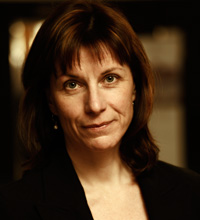Don’t Be an Expert — Listen like a cow!
Listening like a cow? What does this metaphor mean to family enterprise advisors? Read the article by Grant Thornton’s Annika Hall as she explain the benefits of “listening like a cow!”
Succession processes are full of challenges and have potentially far-reaching consequences – not only for present and future owners, but also for society at large. Consequently, they receive intense attention from researchers, consultants and policymakers alike. While I agree on the importance and urgency of the topic, it tends, in my view, to be approached from too rationalistic and, in relation to present and future owners, far too external perspectives. These perspectives typically depart from variables such as planning, structures, finance and tax, in relation to which academics and consultants can take an outsider, expert role and provide “best practice”.
I do recognize that planning, structures and best practice are indeed important ingredients for successful succession outcomes. My argument here is that they are not sufficient, and surely not the place from where to start. Over fifteen years of experience from research and professional advising to family/privately held businesses have convinced me that what is first and foremost needed for a successful unfolding of a succession process are neither experts, nor best practice or planning, but the ability of mindful self-reflection.
Mindfulness is the capacity to be fully aware of all that one experiences inside the self – body, mind, heart, spirit – as well as of the thing happening around us, without evaluating or judging. It means to notice and describe, without forming an opinion or trying to make unpleasant emotions or thoughts go away, but to accept what is there. It is only when we accept what we truly think and feel that we can take responsibility for how we act based on those thoughts and feelings. If, on the other hand, we are not aware, we run the risk of acting them out in ways that are potentially hurtful to others – and in the end to ourselves.
The reason why I believe that mindful self-reflection lies at the heart of succession is that such processes challenge some of our deepest human needs: identity, belonging, meaning and control. Recognizing these existential and emotional sides of succession enables conversations around issues and needs otherwise left aside and unfulfilled. When a succession process comes to a halt, it is typically not because of legal or financial problems, but as a result of individuals lack of true awareness of the emotional challenges, and the subsequent relational issues – misunderstandings, false assumptions and hurt feelings — that result from them re-acting out emotions, rather than mindfully acting on them.
Take the example of a father who wants his four children to take over the business together. This is his dream. He cannot wish for anything more than his four children continuing his lifetime achievement. The problem is, however, that one of the children does not want to. She feels the sibling relationship is not strong enough for them to work together. There have been unresolved conflicts in the past, both among the siblings but also between some of them and the father. She feels pressured and unhappy and she tries to reach out to the father with the message that she does not want to be part of this. But the father refuses to listen. He insists on the siblings taking over together, providing all sorts of “good” arguments for why it would work. Every time the daughter tries to explain to him how she feels, he counters with how he feels, and how it hurts him that his children do not appreciate what he has spent a lifetime creating for them.
I have come across a number of such fathers/founders who seem not to be able to listen either to themselves (Why is it so important for me that they take over together? What do I fear the most? How do I feel when she says she doesn’t want to be part of this? Why do I feel this way?) or to their children. Typically this lack of self-reflection leads to dysfunctional communication patterns and a succession process that is harmful to both the individual and the family as well as to the business.
If we allow ourselves to look deep enough inside, most of us know what we need and fear. Had the father mindfully scrutinized his emotions, he might have discovered that his true fears were actually about a loss of identity and meaning. Had he realized this, he could have taken responsibility for fulfilling these needs without putting this burden on his children by either forcing them to take over the business or making them feel guilty for not doing so. But this kind of internal listening is something that most of us are not trained at. We may also try to silence inner voices because of the messages we would hear if we did listen, as they may not be easily digested or acted upon.
Sometimes, an outside person might therefore facilitate self-reflection. This person’s role is merely to listen. A trap we easily fall in as advisors is to think we have to do the talking and come up with all smart answers. My experience, however, is that this is often not the most helpful thing to do in (the beginning of) a succession process. Quite the contrary, it is often much better to provide the client space for self-reflection by asking a few questions and then be silent and listen – in a very special way: like a cow.
“Pay attention…Just be there. Don’t be thinking about a solution, or how you should fix it. Just listen hard and try to be present. It’s very bad business to invite heartfelt speech and then not listen…What I’m trying to construct here is a theory of attention that depends little on therapeutic skills and formal training: listening like a cow. Those of you who grew up in the country know that cows are good listeners…We don’t need fixing, most of us, as much as we need a warm space and a good cow. Cows cock their big brown eyes at you and twitch their ears when you talk. This is a great antidote to the critical listening that goes on in academia, where we listen for the mistake, the flaw in the argument. Cows, by contrast, manage at least the appearance of deep, openhearted attention.” (Mary Rose O´Reilley, Radical Presence: Teaching as a contemplative practice).
It is my firm belief that a skilled family business advisor needs to master at least two roles: those of process facilitator and expert. In his book Process Consulting Revisited: Building the Helping Relationship,” Edgar Schein skillfully explains the differences and how to move between these roles. Many of us are rather comfortable in the expert role. We are trained to provide knowledge and to have – and give – answers. After all, we might think, what else does the client pay for? But this is not always the right role to take, especially not in the early stage of a succession process, often colored by uncertainty. The simple reason is that we cannot give relevant expert advice if we do not know what the client thinks, feels, needs and wants. And the only one who could possibly know this, is the client.
At times, therefore, it is better not to be experts but cow-like listeners. It is only when each individual is capable of understanding, and taking responsibility for, his or her emotions, needs and wants that a meaningful communication around succession can unfold. Lack thereof will inevitably be obstructive. This is the reason why mindful self-reflection is the very source of answers that can truly make a difference to these complex processes.
About the contributor
 Annika Hall, Ph.D, is director, business advisory, Grant Thornton, Stockholm, Sweden. She can be reached at annika.hall@se.gt.com.
Annika Hall, Ph.D, is director, business advisory, Grant Thornton, Stockholm, Sweden. She can be reached at annika.hall@se.gt.com.




